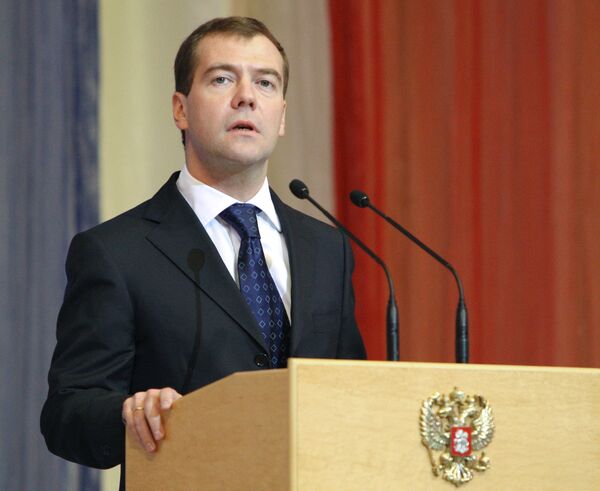MOSCOW. (RIA Novosti political commentator Nikolai Troitsky) – President Dmitry Medvedev’s second state of the nation address sounded more like a report by a business leader at a large economic conference. Avoiding unnecessary pathos, he enumerated the basic problems in all spheres of life in Russia and possible ways to resolve them.
The need for change was the recurrent theme of Medvedev’s address. The president clearly said that we must not wait for change but work to bring it about. He said the time is right for turning Russia into “a fundamentally new global power” and prodding it up “on the civilization ladder.” The country needs “comprehensive modernization based on democratic values,” he said.
The trouble is that Russia can no longer develop on the basis of past achievements in the field of oil and gas, nuclear weapons, or industrial infrastructure. The accomplishments of Soviet professionals are “still keeping the country afloat but their value has depreciated both morally and physically.”
Consequently, we must encourage economic and political reform, even though not all sectors need to be changed radically.
Medvedev said that the development of Russia’s multiparty system is complete and the existing parties have “passed the test of time.” However, there are certain drawbacks that become a special headache during elections. The president proposed “continuing joint work to improve the quality of representative power and to create additional conditions for a free, fair and civilized competition between parties.”
Regional and municipal elections have recently been criticized especially often, Medvedev said. Therefore, the president said he decided after consultations with representatives of public organizations and political parties that the reform of election legislation should shift to the regional level.
First of all, we must “introduce a single rule for determining the number of deputies in a legislature.” It is wrong that Moscow, a city with a multimillion population, has only 35 deputies in its legislature, while the legislature of Tyva, a republic in Siberia with a population 30 times smaller than in Moscow, has 162 deputies. A golden mean must be found here.
Medvedev also mentioned the problem of the parties that lose elections. In his view, “it would be useful for the legislative bodies at all levels to hold at least one hearing a year to listen to the reports and proposals of the parties that are not represented in them.”
In his first state of the nation address a year ago, Medvedev proposed ensuring that the voters of the so-called small parties have a guaranteed representation in parliaments. “The parties that win between 5% and 7% of the vote could be given one or two seats,” he said. “This system would ensure … that the opportunity to speak up is given to small parties representing the interests of a considerable number of people.”
The federal parliament later made relevant amendments to election legislation.
Medvedev has decided to work on that initiative some more, indicating that similar amendments should also be made to local election legislations, thus actually lowering the threshold from 7% to 5%. There are reasons to believe that these amendments will be approved in all Russian regions in time for the next elections.
The president also spoke against the collection of signatures as a mandatory condition for taking part in elections. However, this is not a task for the immediate future, just like the transfer of all regional and municipal elections to a proportionate system of representation in accordance with party lists.
Medvedev’s other election proposals are also rooted in the initiatives he advanced a year ago. He proposed restoring order in the system of early voting in local elections, saying that the aim has already been achieved at the federal level. He also said that all parties must be given equal opportunities to use municipal premises for conducting their election campaigns, and that the regions must adopt laws to guarantee equal media coverage for the parties represented in regional parliaments. And lastly, he said that special articles must be added to the regional charters and republican constitutions stipulating annual reports by the local administration heads to local parliaments.
The president also said that the State Duma, the lower house of Russia’s parliament, should broadcast its meetings that are open to the public, and that the upper house – the Federation Council – and the Constitutional Court should consider doing this too.
Though, Medvedev has said more than once that every possible measure must be taken to increase openness and transparency of government bodies.
And lastly, the president spoke about his favorite issue, corruption. This year he spoke concisely but clearly: “The problem cannot be resolved by arrests alone, but arrest we must.” He told the skeptics that 4,500 corruption cases were investigated in the first six months of 2009 and the verdict of guilty was passed on 500 state officials and over 700 employees of law-enforcement agencies.
The opinions expressed in this article are the author’s and do not necessarily represent those of RIA Novosti.
Medvedev says Russia must rise higher on civilization ladder

© RIA Novosti
/ Subscribe
MOSCOW. (RIA Novosti political commentator Nikolai Troitsky) – President Dmitry Medvedev’s second state of the nation address sounded more like a report by a business leader at a large economic conference. Avoiding unnecessary pathos, he enumerated the basic problems in all spheres of life in Russia and possible ways to resolve them.


